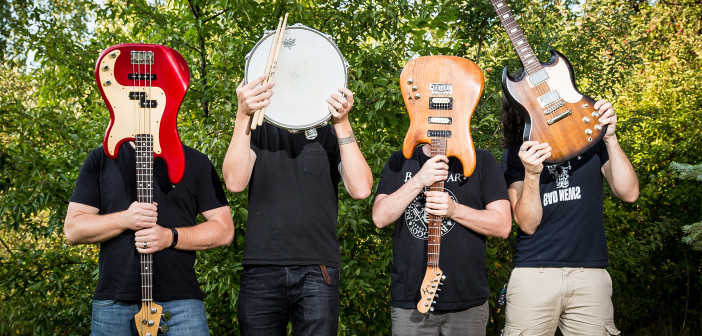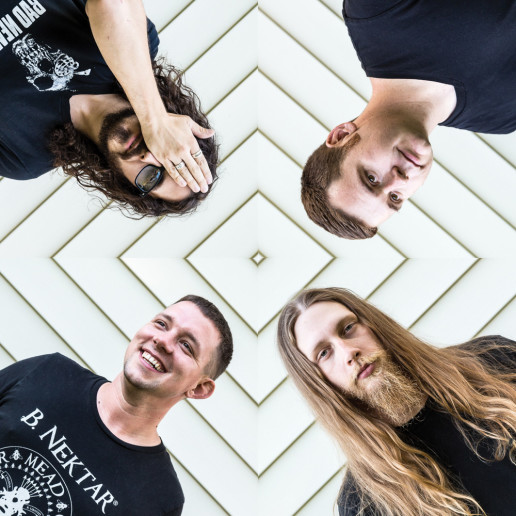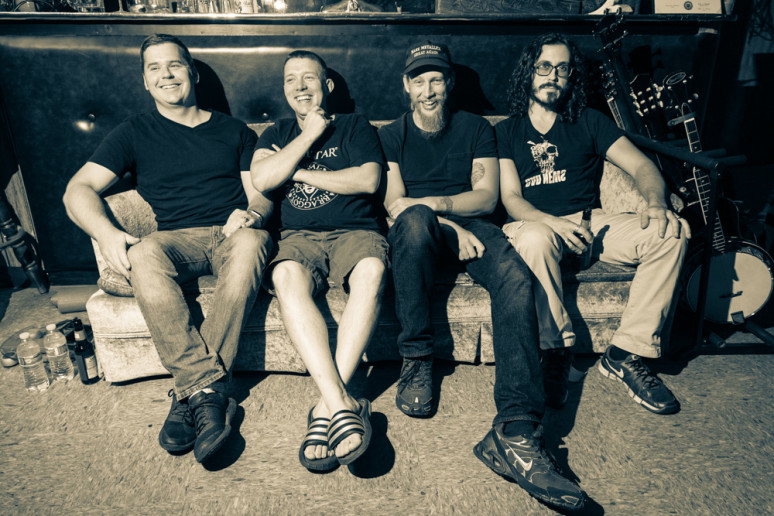Bruce Horn, a Holly native, has been playing in bands since he was 11. “I was 11 with a bunch of dudes in their 20s, and we played one of the last shows at the Capitol Theatre,” Horn recalls. He is also the only member of the Jon Fett Quartet who has been there through the entire 15-year span of the bar band now gaining a recent resurgence in acclaim. Horn attributes this to finally finding a group that clicks. “The lineup has changed numerous times – there have probably been 20 people in this group,” he says. “Aside from my other projects, I was always working on this bar band. I considered it dying, and then these guys came in. They are just amazing musicians and great to hang out with, and I feel that ‘brother’ feeling all over again. I think that is why the band is doing so well right now. We’re getting tons of shows and a great response at the shows.”
Horn plays guitar, sings, and books gigs for the Jon Fett Quartet (JFQ). Doug Wilson, (bass and vocals) was brought in by an old friend and former JFQ drummer. Wilson shares, “what drew me to rock and roll is the overall energy that happens when there are three or four people making music together, and making it powerful.” The JFQ has no shortage of energy. It is that dynamic at their live shows that keeps the crowds coming and the band booked.
Paul Owsinski, (lead guitar) and Horn have known each other since long before Owsinski joined JFQ. “Bruce and I go way back – we were college buddies at UM-Flint Jazz Band,” he explains. Aaron Reinhard, on drums and vocals, also went to UM-Flint, but it wasn’t until Horn reached out to him last November that the current group came together.
So, who is Jon Fett? The band’s fans may have heard different versions of the story, and while we don’t want to ruin any preconceived notion you may have about the character of Jon Fett … here goes. The real Jon Fett was the bass player. Horn explains: “Jon Fett’s dad was in a band in the 70s – and this is a story I don’t even think the rest of the band knows – they were a jazz group, and we always liked the ring of it. At the same time, we were fans of “Spinal Tap” humor; in other words, the bass player was the loser of the band, someone you’d never give any credit to. So, we named the band after the bass player.” When that bass player left JFQ, the band already had a following under that name and gigs booked a year in advance, so they decided to keep it. “That made it even funnier,” Horn adds.
At their high-energy live shows, the music they play spans the decades, depending on the age demographic of the bar patrons on a given night. They start out with songs from the 60s/70s, the middle set is 70s/80s, “and we try to get people dancing, dancing, dancing,” Horn emphasizes. The last set is geared toward the 80s/90s, and they even go into some heavier, early 90s/00s songs. Horn explains one reason why JFQ has gained popularity: “When you go into a bar where there’s live music, there are certain songs that every single band plays, and there was a point when I decided there are other, much better songs. And so, we started playing the less-popular, less radio-friendly songs.” The response from the crowds was noticeable. “People would come up to us after a show and instead of hearing, ‘you guys are really good,’ they were really reacting to the song choices saying, ‘oh, man – I remember that song and when I was seven years old …’ so there was a more personal connection and they really appreciated it.”
“What drew me to rock and roll is the overall energy that happens when there are three
or four people making music together, and making it powerful.” – DOUG WILSON
Horn believes that JFQ works so well because they stay true to the songs. “We have the energy of the song, and the passion that was originally there,” he explains. “When you go into a bar and see a group that grew up with the music they play, and they’re just standing there, not feeling it – that’s not what we do. At our shows, the band feels it, the crowd feels it and everyone has a good time. Everyone dances and we all have fun. I think that’s the point.”
The group explains that they are able to keep that energy for a couple reasons. “One reason is that we keep learning new songs,” Doug Wilson says. Every week, JFQ gets together to learn four new songs. They all bring ideas and then choose together. That is what keeps it fun and fresh for them. But, there is something undeniable about the energy and passion they have for the music they play. Horn says, “they are good songs! I’m going to act the same way on stage as I do when I hear one of them on my car radio.”
This Jon Fett Quartet is working so well together, they’re not going to stop at JFQ. Horn, Owsinski, Reinhard and Wilson are also writing original music together under the name, Werewolves. The name is a nod to the origins of Horn’s bar-band story. When he was 20, he and his friends saw two guys playing Steve Miller covers at a local bar, “and it was horrible,” Horn explains. He talked to his friend who owned the bar and they put together one show as Werewolves. “We played maybe 17 songs, and there were so many people there and such a great response that we had to do those 17 songs again,” Horn remembers. “After that, we made it an every-other-weekend, drink-for-free-gig, and pretty soon it was a regular thing where the band was just non-stop.”
It seems that the energy from the original Werewolves may have found its way back.
Check out JFQ on facebook.com/jonfettquartet.
Photography by Eric Dutro
















